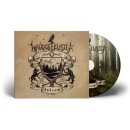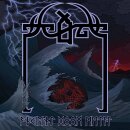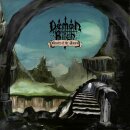Northern Silence Productions, Collector's Edition in 6-panel digipack, limited to 1000 copies.
About the new album:
’Metanoia’ fully follows the essence of the previous albums. On the ’Esse Est Percipi’ album, there is a song whose lyrics are about withdrawal. To retreat to the mountain, of course, this shouldn't be understood physically, but spiritually. To wait for the time when it is possible to descend from the mountain. But I didn’t go up there to live as a hermit and let the spirit of the great prophet be born in solitude, flooding the world with lonely thoughts, like the German Antichrist did. When I started this journey, it was as if the world didn't even exist. The dance of circumstances cannot be called a world. It can only be left behind. So I came here to create, to create a world, where on the path leading up, the ancient sayings still echoed in my ears: "We are what our world shapes us into, and our environment molds the basic lines of our soul." Here, the idea of Ján Patočka's 'life on the peak' returns, to reach the realm of the absolute subject, or at least to reach the epoché, to want to practice dedicated inquiry, to live by the requirements of the transcendental decision. The long journey's fatigue required that I shed my ideas, beliefs, and opinions, because otherwise, I wouldn't have been able to reach the summit, as they bound my soul to the lower life as a burden. So, along the way, I became a monster, a hideous thing, a despiser of life, a favored one of God, a servant of Satan, a follower of demons, the plucker of Odin's eye, a Longinus, a Pilate. By the time I reached the top, I had been freed from everything. The only thing I could keep was one thing. The memory of an inscription from an ancient Greek temple, which I first heard long ago and which drove me to wander. But today, it rather urges me to throw everything away, like a fleeing soldier discarding his weapons. This inscription is gnothi seauton, which has held its teaching in secret for so many years, and cannot be bypassed if someone wants to ascend to the mountain peaks. The metanoia brought me here, to search for another world instead of the one I had.
The Greeks express their secret teachings about life, but at the same time, they also remain silent about them in their gods – says Friedrich Nietzsche. This style was mastered by the German philosopher, who acts similarly when he conveys his teachings through his Zarathustra. He speaks deliberately in silence, withholding, as a wise teacher, expressing his own truth with moderation and cloaked in eloquence. He hides behind words and waits for those who are the fewest in number and perhaps have not yet even been born. They are the ones who can follow and overcome the tragic limitations within themselves to become overman, or in another translation, the übermensch. This group no longer sings hymns or composes songs in distant forests while laughing and crying, for their ears have been opened and they are capable of hearing the 'antichristian good news.' Although they hold their heads high, they can no longer truly raise their gaze. The sky, which they could once look up to, has vanished from their field of vision, and anyway, their eyes have lost the ability to see far. At this point, everything is blurred, and since nothing can be seen clearly, it's irrelevant and boring.
History is exactly like this, which they have already learned to surpass, and they no longer seek its origins. It is pointless to keep looking back like a crab while moving forward, for they have already embraced the conclusion: with Protagoras’ teaching, they managed to leap over 2,500 years of misunderstanding. If human thought was truly born in Plato’s cave, then the overman (homo mensura) is undoubtedly the work of Protagoras. The former must continuously live in self-denial, must discover truths, and must experience anxiety and fear, while the latter, in contrast, does not impose normative standards or strict rules upon itself. However, both of their goals are the same: nothing less than a peaceful sleep. For what the human struggles with all day long, the overman achieves without much effort. Only those who reject virtue can sleep peacefully, for one must also keep watch over virtues. It doesn’t matter whether it’s day or night. The shift lasts twenty-four hours. But while the human suffers from sleeplessness during the day, what does the overman, who is always enviably rested, fresh, and cheerful, do? The answer is simple: he idles and lounges. He allows the rays of sunlight to bathe him in light. He allows the earth to provide the solid ground beneath his feet. He allows the infinite vitality inherent in life to empower him, and within the boundaries he has willingly accepted, he unfolds his own will. He does all of this to assert his self in life, to fulfill it, to triumph over the world, which – to say it in Schopenhauer’s words – is will and representation. He no longer sees the sun but rather an eye that sees the sun, and he does not touch the earth but rather a hand that touches the earth.
In contrast, the human seeks rational explanations and causal connections behind the sun and the earth. This is precisely where his restlessness and sleep disturbances lie, in the fact that he cannot find the ultimate truth, as he only ever keeps reaching stations along the way. These chains of cause and effect lead him into the infinite, which he is incapable of comprehending, but even more so, incapable of accepting. He faces the same dilemma in the realm of morality and logic, which he strives to refine and apply in his own life, of course according to the strictest principles. Amidst all this preoccupation, it is no wonder he has no time to rest. Have his masters ever taken their eyes off the truth, even for a moment? Has it ever happened that they looked down from the sky to the earth before them?
According to Nietzsche, they learned from Socrates the ability to break everything down into its elements, everything that stems from life. This method even received a name: diairesis. Or more recently – and more fashionably – it is also called rational. Through this filter, nothing passes that might be intangible, something in which a person could place their life and find peace. Sapere aude! Thus cries out another philosopher, and God dies. Today, they no longer kill with cross but with words. This was the condition for mankind, after so many years, to finally see clearly—objectively – and to cease besieging closed gates with the excesses of its conceptions, for they will not open anymore. The last man has therefore shut metaphysics out and, at the same time, defined its precise boundaries, so he knows how far he can go. There is no longer any drunken debauchery or wandering. Even the last man has found his way out of the labyrinth of centuries. With this, Dionysus has fallen for good.
It is often heard that we live in a nihilistic world. But instead of the long-desired overman, has not rather the inverse last man been born in this nihilistic atmosphere? Nietzsche did indeed sever the earth from the sky and directed gazes towards mere existence, but he did not create qualities that transcend themselves. He may have dethroned the lord of centuries, but his place was not taken by mere existence; rather, it was taken by the individual person. The overman did not populate the earth. If he exists at all, it is only deep in forests, in the darkness of caves, and in the cold of mountains—definitely far from the eyes.
The inverse last man – the one turned inside out –, however, has spread. He has been liberated, understood the change, but has turned his strength against himself, for he is satisfied with the mere reality devoid of ecstasy. He has placed himself in objective existence and no longer cares to step back and observe life from a distance. He follows neither god (Dionysus) nor man (Socrates) anymore. The only thing he recognizes as authoritative is his own self-importance. He abuses life, continuously exploits and robs it. They are the ones who incessantly corrupt and destroy everything in the name of hedonism. For them, the past has also lost its significance, and the terrible nature of decay has no effect on them. They live only in the present, where they can turn their gaze away from their own mortality without disturbance, but not for the reasons the overman does, for the sake of eternal recurrence, but because they see no further than the mere present. Thus, their dwelling is only the moment, and not life itself!
Nietzsche's thinking is a monumental revelation because his thoughts were not born under the sign of death. They are completely vital, driven not by otherworldliness but by life itself, in which he places himself under the banner of eternal recurrence and cries out in the world: memento vivere! With this, he awakens the dead. He calls upon them to live, instead of searching for something beyond themselves throughout their lives. Otherwise, moralizing and virtue signaling remain. In other words, the restless sleep. But is it worth following this call? Memento vivere? This is something everyone must decide for themselves.
Kierkegaard writes in his monumental work Either/Or that living in memory means living the most perfect life. Moments of perfect solitude that don't last longer than a flash. It is a desolate space, where only the person who remembers can return and bring the forgotten characters to life. Its perfection lies precisely in this, that it is unchangeable and that we can taste a drop of eternity. But don't let anyone think that someone has to retreat to memory in order to relive the old moment. That's out of the question. This is the domain of solitude, where we can walk like a victorious general on the fields after a battle. Here everything and everyone is dead and can only be alive if the will revives it. In any case, we have to talk about a tragic fate if this loneliness means the most perfect life. However, everyone reaches the place in their lives where tragedy is born. It can only emerge where there is more behind life than before it. Therefore, after a certain time, it is better to reject freedom and live under the guidance of rule.
The creation of the album was the result of influences stemming from an inner struggle. My main goal was to overcome the harmful effects that stem from the world, and Metanoia, as a change in thinking, represented the transformation of a realistic existence. The album starts from the unassimilability of life. The questions concerning existence build the entirety of reality, to which there are no comforting answers, because the answers always draw the knower further and further into the deep trench of knowledge. Realizing this requires a different kind of approach. One is never safe, because one must fight every day to keep the ground from slipping beneath their feet. The consciousness sinks into such darknesses where everything tangible ceases to exist, and life is plunged into an eternal sleep. This is what one must either get used to or fight against. Such a battle is the new album, with some of its tracks presenting the struggle for life from different perspectives.
The last song on the new album is a very special one for me. This was inspired by an EP from the band Hypomanie. I often listened to this album in the past, and it was able to have an emotional impact on me, even though it doesn't contain any vocals. That's why this track is also instrumental on the album.
Fifteen years ago, the first Autumn Nostalgie song, Grey Horizons, was written—though it wasn't released until 2020. For a decade, the entire project existed in complete obscurity, unable to come to life as the circumstances weren’t right. The nostalgia that seeks to manifest itself through music is not a mere outpouring of emotions. It does not intend to convey weak sentimentality but rather to strengthen and guide us back to a world that can no longer be experienced—a world where music turned people inward rather than outward. We don’t listen to Blaze in the Northern Sky or Deathcrush for the hundredth time because they entertain us or make us feel comfortable with the actual world, leading us to behave like everyone else who treats life as a mere pursuit of pleasure. This genre has never offered such comforting dissolution; instead, it has always drawn the listener inward, toward the self—beyond the metal riffs, blast beats, and all other profane, external elements. These are secondary compared to the essence that truly matters. The most important thing is to turn the individual away from the world, to shape oneself according to one’s inner nature, rather than being carried along aimlessly by the shifting forces of the present. Can this experience still be found in nowaday”s bands? Does music still have the power to transcend mere musicality and create that distancing effect from the world? It’s no coincidence that we retreat into nostalgia, where the present reality fades away, and we find ourselves in a spiritual realm where that same darkness still lingers—the only force that illuminates the world as experienced through the self.
| Item weight: | 0,10 kg |
Manufacturer:
Name: Northern Silence Productions GmbH & Co. KG
Address: Gasanstaltstr. 174 A, 09474 Crottendorf, Germany
E-Mail: info@northern-silence.de





